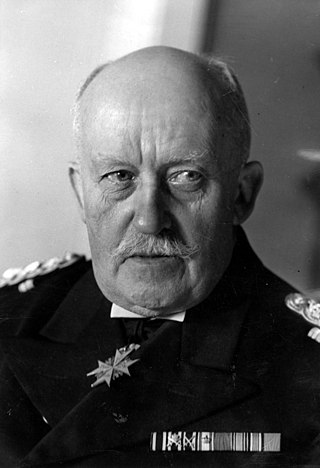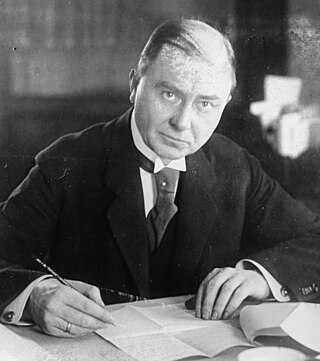Related Research Articles

The Province of Hohenzollern was a district of Prussia from 1850 to 1946. It was located in Swabia, the region of southern Germany that was the ancestral home of the House of Hohenzollern, to which the kings of Prussia belonged.

Julius Lippert was a German Nazi Party politician who served as the Staatskommissar for Berlin from 1933 to 1937 and as its Oberbürgermeister and Stadtspräsident from 1937 to 1940.

Hermann Eduard Johannes Popitz was a Prussian lawyer, finance minister and a member of the German Resistance against the government of Nazi Germany. He was the father of Heinrich Popitz, an important German sociologist.

Kurt Paul Schmitt was a German jurist versed in economic matters. A supporter of the Nazis since 1930, he joined the Nazi party in 1933, becoming also an honorary SS. He presided over Allianz insurance company, and was the Reich Economy Minister from 1933 to 1934. His antisemitic views led him to believe that the role Jews played in politics, law and the arts was excessive, and had to be drastically curtailed if not totally eliminated.

Adolf von Trotha was a German admiral in the Kaiserliche Marine. After the German revolution he briefly served as the first Chef der Admiralität, which replaced the imperial Reichsmarineamt. After supporting the Kapp-Lüttwitz Putsch of March 1920 he resigned his post. He later held several political and maritime posts in the Third Reich.

Karl Jarres was a German lawyer and politician of the German People's Party during the Weimar Republic. From 1923 to 1924, he was the minister of the Interior and vice-chancellor of Germany. Jarres was also the long-serving mayor of Duisburg from 1914 to 1933. After the Nazis deposed him, he started a career in industry.

The Prussian House of Lords in Berlin was the upper house of the Landtag of Prussia, the parliament of Prussia from 1850 to 1918. Together with the lower house, the House of Representatives, it formed the Prussian bicameral legislature. The building is now used as the seat of the German Bundesrat.

The Prussian State Council was the second chamber of the bicameral legislature of the Free State of Prussia between 1921 and 1933; the first chamber was the Prussian Landtag. The members of the State Council were elected by the provincial parliaments and gave the provinces of Prussia a voice in the legislative process. The Council had an indirect right to introduce legislation, could object to bills passed by the Reichstag and had to approve expenditures that exceeded the budget.
Gustav Hermann William August Koenigs was a German lawyer and State Secretary of Transport during the Weimar period and the Third Reich. The conspirators of the 20 July plot planned for him to become Reich Transport Minister had the coup d'état succeeded. He was arrested and released by the Gestapo and died in an airstrike toward the end of the Second World War.

The Prussian State Councilof Nazi Germany was an advisory body to the Prussian minister president from 1933 to 1945. It was the successor to the Weimar Republic body of the same name that represented the interests of Prussia's provinces in the legislative process. In Nazi Germany its members were either appointed by Prussian minister president Hermann Göring or were members as a result of their official positions in the state of Prussia. The Council met only six times and ceased to exist with the end of Nazi rule in 1945.
Kurt Melcher was a German lawyer and politician who served as the police chief of Essen and Berlin between 1919 and 1933. He was also briefly the Oberpräsident of the Prussian Province of Saxony, and served as the Trustee of Labour for public service from 1935 to 1945.
Ernst Brandes was a German lawyer, estate manager and politician. During the Weimar Republic he was an influential agricultural administrator at the state and national levels. After the Nazi Party came to power, he was removed from his administrative positions.

Wilhelm Hermann Kutscher was a German lawyer and politician who served in the Prussian civil service during the German Empire and the Weimar Republic. He was the Oberpräsident of the Province of East Prussia from 1932 to 1933 and was forced out of office after the Nazi Party came to power.
Gustav Wagemann was a German lawyer and judge who worked in the Prussian Ministry of Justice under the German Empire, the Weimar Republic and Nazi Germany. He died in an airplane accident in December 1933.

Hermann Werner Rodrigo Heinrich Friedrich Donatus Burggraf und Graf zu Dohna-Finckenstein was a German estate owner, politician and SS-Obersturmbannführer.

Wilhelm Heinrich Börger was a German Nazi Party functionary and SS-Brigadeführer. He held several administrative positions, including as a Trustee of Labour and a Ministerial Director in the Reich Ministry of Labor. He also sat as a member of the Reichstag and the Prussian State Council. Following the defeat of Nazi Germany in the Second World War, he was interned for three years and released.

Georg Ferdinand Philipp Maria von Detten was a German army officer, Nazi Party politician and SA-Gruppenführer. He was extrajudicially murdered in Adolf Hitler's purge of the SA, known as the Night of the Long Knives.
Rudolf Jakob Schmeer was a German Nazi Party politician. He held a number of Party and government positions during the Third Reich, and worked very closely with high ranking Nazis such as Robert Ley, Hermann Göring, Walther Funk and Albert Speer.
Hans Elhard von Morozowicz was a German military officer, a high-ranking official in Der Stahlhelm and a Gruppenführer in the Sturmabteilung (SA). He was also a deputy in the Reichstag and died in an automobile accident at age 40.
References
- ↑ President, if the King did not hold the presidency himself
- ↑ Gilman, D. C.; Peck, H. T.; Colby, F. M., eds. (1905). . New International Encyclopedia (1st ed.). New York: Dodd, Mead.
- ↑ Recht als Erbe und Ausgave: Heinz Holzauer zum 21. April 2005
- ↑ Coburn, H (1837): The United States Magazine
- ↑ Deutsche Biographie
- ↑ rbb Preußen Chronik | Gustav Adolf Rochus von Rochov
- 1 2 3 Joachim Lilla, „Die Vertretung der Rheinprovinz im Preußischen Staatsrat (1921 bis 1933) und im Reichsrat (1921 bis 1934)“ (version of 9 October 2012), on: Portal Rheinische Geschichte: Das Informationssystem zur rheinischen Geschichte, retrieved on 5 November 2010.
- ↑ Joachim Lilla (2005): Der preußischer Staatsrat 1921-1933, Düsseldorf